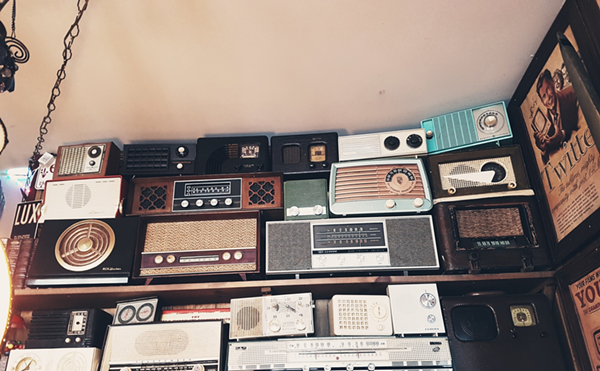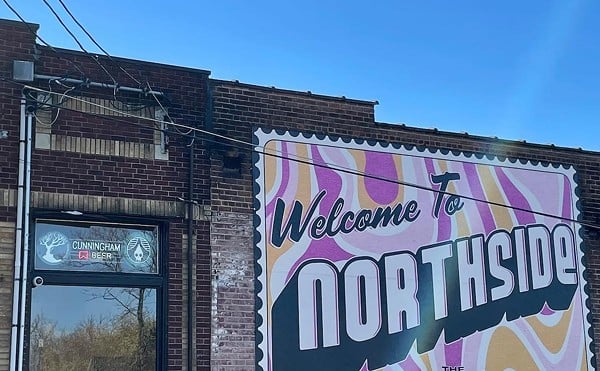In existence for just over a year, Surfer Blood seems to have arrived on the scene fully formed.
The West Palm Beach, Fla., quartet's debut full-length, Astro Coast, is an uncommonly cohesive set of songs informed (but never bound) by 25 years of Indie Rock touchstones and founder/frontdude John Paul Pitts’ own unique vision, which includes everything from the album's distinctive visual design to its relationship-delving lyrics. Released by tiny Kanine Records in January and anchored by the addictive album-opening one-two of “Floating Vibes” and “Swim,” Astro Coast gathered steam quickly, racking up positive notices across the Internet, including a rave from the influential tastemakers over at Pitchfork.
In anticipation of Surfer Blood’s debut MidPoint appearance, CityBeat recently phoned Pitts to discuss his band's rapid rise from grandiose bedroom project to music-festival veterans.
CityBeat: It's been an eventful summer for you guys, playing the Pitchfork Music Festival and now MidPoint. The Internet has obviously changed things radically in ways both good and bad. In your case, it's gratifying that essentially a couple in New York (Brooklyn-based Kanine Records is run by Lio and Kay Kanine) can put out a record and within weeks thousands, if not hundreds of thousands, of people can hear it. Are you surprised things have happened so quickly for you?
John Paul Pitts: Not everyone is so lucky. A lot of it for us was hard work, playing a lot of shows, playing a lot of showcases and stuff. And we’re pretty proud of our record. It's cool and kind of weird going out on our first big support tour with Art Brut and Japandroids in October and November (of 2009). We were playing to 200 people a night in the support slot, and there were people at the shows who were singing the words to our songs before our record had even come out. In some ways the Internet is bad because people feel entitled to free music — a lot of people don’t buy records anymore — but at the same time there are so many bands who have a following they’d never be able to have without the Internet. It’s definitely a double-edged sword.
CB: I didn't know until recently that you wrote and even recorded most of Astro Coast before you formed the full band. How did doing almost everything yourself impact the writing and recording?
JPP: I feel like when I was writing the record I was reaching in a lot of different directions and trying to pull off a lot of different things. I'm just really happy that it all came together because I was worried that it was going to come across as scattered and all over the place. But it doesn't, and I think that comes down to an artist kind of putting his thumbprint on something.
CB: You seem pretty savvy about music in general and the direction you want to take the band. Where does that come from? Did you grow up in a musical household?
JPP: Yeah. My dad was a musician. His whole side of the family just has a real gift for it. He can hear a song twice and pick it up on guitar, so he’s a pretty talented dude. My friends all started playing guitar when I was in middle school and I took a real interest in it. I’d go to their house and play all the time. And, naturally, my dad was pretty excited when I started learning to play guitar. He would teach me songs by Cream or The Who. From the time I started playing guitar, it was about playing other people’s songs, but I was interested in writing my own songs. Before I could really play anything besides two or three chords I was trying to make up songs. Some of the early efforts are obvious rip-offs of my favorite bands, but I’ve been writing and recording songs since I was 15 years old.
CB: It’s interesting because many people have talked about the record’s various Indie Rock touchstones, but you managed to distill those influences through your own vision. Speaking of touchstones, I hear a lot of late-era Sonic Youth in there.
JPP: That’s really cool, because they’re one of my favorites. I personally think current Sonic Youth is every bit as good as Daydream Nation.
CB: I would imagine your ultimate goal would be to have that kind of longevity and, like them, still remain creatively vital.
JPP: I’m good at other stuff, but this is pretty much what I want to do for years and years to come. It’s scary that when a band like Sonic Youth was coming along it took them four records to even find their sound and build an audience and get recognized. Stuff happened for us so fast that it makes me worried that the life cycle of our band will be shorter. I think it’s harder for bands today — they have to keep putting out good records and they have to stay on the road. They can’t afford to be like The Beatles and decide they don’t want to tour for the last five or six years of their career.
SURFER BLOOD plays the MidPoint Music Festival Friday at The Cincinnati Club starting at 11:30 p.m. Get show and venue details here. Get all the MidPoint details here.





